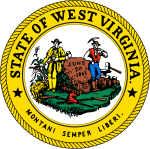
William Gaston Caperton III is an American politician who served as the 31st governor of West Virginia from 1989 to 1997. He was president of the College Board, which administers the nationally recognized SAT and AP tests, from 1999 to 2012. He is a member of the Democratic Party.

The 1976 United States Senate elections was an election for the United States Senate. Held on November 2, the 33 seats of Class 1 were contested in regular elections. They coincided with Democrat Jimmy Carter's presidential election and the United States Bicentennial celebration. Although almost half of the seats decided in this election changed parties, Carter's narrow victory did not provide coattails for the Democratic Party. Each party flipped seven Senate seats, although, one of the seats flipped by Democrats was previously held by a Conservative.

United States gubernatorial elections were held on November 2, 2004, in 11 states and two territories. There was no net gain in seats for either party, as Democrats picked up an open seat in Montana while defeating incumbent Craig Benson in New Hampshire, while Republicans defeated incumbent Joe Kernan in Indiana and won Missouri after Bob Holden lost in the primary. These elections coincided with the presidential election.

The 1960 United States Senate elections coincided with the election of John F. Kennedy as president on November 8, 1960. The 33 seats of Class 2 were contested in regular elections. A special election was also held on June 28, 1960, for a mid-term vacancy in North Dakota where Democrats flipped a seat to expand their majority to 66–34. As Majority Leader Lyndon Johnson was elected Vice President, Mike Mansfield became the new majority leader.

The 1958 United States Senate elections were elections for the United States Senate which occurred in the middle of President Dwight D. Eisenhower's second term. Thirty-two seats of Class 1 were contested in regular elections, the new state of Alaska held its first Senate elections for its Class 2 and 3 seats, and two special elections were held to fill vacancies.

Cleveland Keith Benedict is an American politician. A member of the Republican Party, he served one term in the United States House of Representatives for West Virginia's 2nd congressional district from 1981 to 1983.
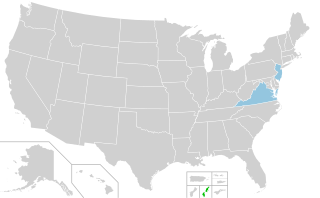
United States gubernatorial elections were held on November 8, 2005, in the states of New Jersey and Virginia as well as in the U.S. commonwealth of the Northern Mariana Islands.

United States gubernatorial elections were held on November 7, 2000, in 11 states and two territories. The elections coincided with the presidential election. Democrats gained one seat by defeating an incumbent in West Virginia. As of 2024, this remains the last gubernatorial cycle in which a Democrat won in Indiana.
Charlotte Jean Pritt is an American educator, businesswoman, and politician in the U.S. state of West Virginia. From 1984 to 1988, she served in the West Virginia House of Delegates, representing Kanawha County. From 1988 to 1992, she served in the West Virginia State Senate. She ran unsuccessfully for West Virginia governor in 1992, 1996 and 2016 and for West Virginia Secretary of State in 2000.

Mario Joseph Palumbo was an American attorney and Democratic politician from Kanawha County, West Virginia.

West Virginia's 2012 general elections were held on November 6, 2012. Primary elections were held on May 8, 2012.

The 1996 United States elections were held on November 5 1996. Democratic President Bill Clinton won re-election, while the Republicans maintained their majorities in both houses of the United States Congress.

The 1874–75 United States Senate elections were held on various dates in various states. As these U.S. Senate elections were prior to the ratification of the Seventeenth Amendment in 1913, senators were chosen by state legislatures. Senators were elected over a wide range of time throughout 1874 and 1875, and a seat may have been filled months late or remained vacant due to legislative deadlock. In these elections, terms were up for the senators in Class 1.
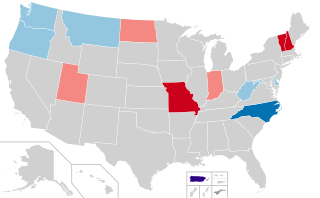
United States gubernatorial elections were held on November 8, 2016, in 12 states and two territories. The last regular gubernatorial elections for nine of the 12 states took place in 2012. The last gubernatorial elections for New Hampshire, Oregon, and Vermont took place in 2014, as Oregon held a special election due to the resignation of Governor John Kitzhaber, while the governors of New Hampshire and Vermont both serve two-year terms. The 2016 gubernatorial elections took place concurrently with several other federal, state, and local elections, including the presidential election, Senate, and House elections.
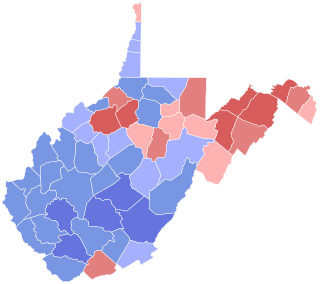
The 2016 West Virginia gubernatorial election took place on November 8, 2016, to elect the governor of West Virginia, concurrently with the 2016 U.S. presidential election, as well as elections to the United States Senate in other states and elections to the United States House of Representatives and various state and local elections. The primaries were held on May 10.
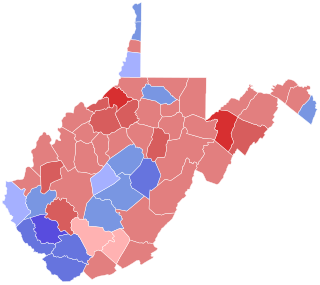
The 1996 West Virginia gubernatorial election took place on November 5, 1996 to elect the Governor of West Virginia. Republican Cecil Underwood, who had previously been the Governor of West Virginia from 1957 to 1961, defeated Democratic State Senator Charlotte Pritt. Concurrently, the state voted the opposite way federally, choosing Democratic U.S. Presidential nominee, incumbent Bill Clinton over Republican nominee Bob Dole in the Presidential election that year.

The 2020 United States Senate election in West Virginia was held on November 3, 2020, to elect a member of the United States Senate to represent the State of West Virginia, concurrently with the 2020 U.S. presidential election, as well as other elections to the United States Senate in other states, elections to the United States House of Representatives, and various state and local elections.

United States gubernatorial elections were held on November 3, 2020, in 11 states and two territories. The previous gubernatorial elections for this group of states took place in 2016, except in New Hampshire and Vermont where governors only serve two-year terms. These two states elected their current governors in 2018. Nine state governors ran for reelection and all nine won, while Democrat Steve Bullock of Montana could not run again due to term limits and Republican Gary Herbert of Utah decided to retire at the end of his term.

West Virginia held elections on November 8, 2016. Elections for the United States House, as well as for several statewide offices including the governorship were held. These elections were held concurrently with the 2016 U.S. presidential election and other elections nationwide. Primary elections were held on May 10, 2016.
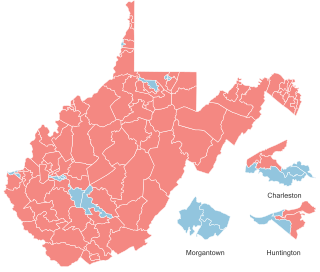
The 2022 West Virginia House of Delegates election was held on November 8, 2022, electing all 100 members of the chamber. This coincided with the election of 17 of West Virginia's 34 state senators, and the election of West Virginia's two U.S. representatives. Primary elections were held on May 10, 2022. Due to redistricting, this was the first House of Delegates election in which all members were elected from single member districts, with West Virginia following a trend of states phasing out multi-member districts in recent decades.

